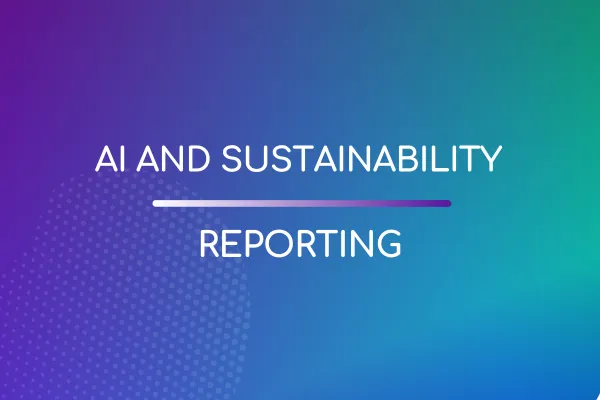Read Our Latest Blogs
Welcome to our blog where we embark on a journey to explore the transformative potential of sustainability for small and medium-sized businesses (SMBs). In the wake of climate change, resource depletion, and a heightened awareness of our environmental impact, SMBs stand at the forefront of redefining success by placing equal importance on profitability and planet-friendly practices.

The Role of AI in Simplifying ESG Reporting and Accelerating Decarbonisation
With only 10% of Australian companies currently measuring their carbon emissions and few achieving their reduction targets, the need for full value chain carbon reporting has never been greater. The introduction of mandatory climate and ESG reporting on January 1, 2025, marks the most significant shift in corporate disclosure requirements in a generation. Companies must now implement transparent, accountable, and comprehensive carbon measurement strategies to meet their Scope 3 emissions reduction goals.
Despite the growing urgency, businesses face several challenges in ESG reporting. The complexity of value chain mapping, particularly for Scope 3 emissions, remains a significant barrier. Many organisations struggle with data collection, inconsistent reporting standards, and a lack of transparency across increasingly global supply chains. The high costs and resource requirements of ESG compliance further deter widespread adoption. Additionally, companies risk reputational damage if their sustainability claims are challenged due to inaccuracies or greenwashing concerns.
However, these challenges also present opportunities. Businesses that successfully integrate ESG reporting achieve enhanced investor confidence, improved risk management, and competitive advantages in a low-carbon economy. Transparent ESG reporting enables organisations to attract sustainable investment, comply with evolving regulations, and build stronger relationships with customers and stakeholders. Moreover, leveraging AI-driven solutions can streamline ESG data management, reduce compliance costs, and provide deeper insights into emissions reduction strategies.
One promising approach is the Partnership for Carbon Transparency (PACT) methodology, which offers a simplified way to calculate product carbon footprints. When combined with AI-powered tools, this methodology can revolutionise ESG reporting by automating data analysis, identifying inefficiencies, and accelerating sustainability efforts.
Exploring the potential of AI in ESG reporting
ESG reporting has become a critical component of corporate sustainability strategies. As companies face increasing regulatory pressure and stakeholder expectations for transparency, AI is emerging as a game-changer in streamlining ESG reporting, enhancing accuracy, and driving strategic decision-making by providing:
Sustainability Transparency
AI enhances sustainability transparency by automating real-time emissions tracking and reporting. Advanced AI-powered dashboards can consolidate data from various sources, such as smart meters, IoT devices, and satellite imagery, providing a clear picture of corporate carbon footprints. For instance, renewable energy providers, such as solar and wind farm operators, can use AI to monitor real-time power generation data and ensure their emissions reduction targets align with actual performance.
Auditability – Built-in Trust
AI supports auditable, traceable data trails by automatically validating emissions inputs, flagging anomalies, and linking source documentation (e.g. invoices, sensor data, energy bills) to carbon calculations. A mining company in Western Australia uses AI to validate diesel consumption data across multiple sites, ensuring Scope 1 emissions are verifiable and aligned with Australia’s mandatory climate reporting.
Climate Scenario Planning
Predictive AI models help businesses simulate future climate risks and assess the impact of different emissions reduction strategies. AI-driven scenario analysis allows companies to evaluate climate scenario planning by helping businesses assess climate risks, simulate future scenarios, and make data-driven decisions to build resilience. By analysing vast datasets from sources like the CSIRO and BoM, AI can forecast climate-related threats such as floods, heatwaves, and supply chain disruptions. It enables companies to stress test operations under different climate futures.
For example, an Australian agribusiness can use AI to model how changing rainfall and temperature patterns might affect crop yields, enabling smarter irrigation planning and investment in climate-resilient crops.
Supply Chain Optimisation
AI helps businesses optimise their supply chains by improving visibility, enhancing efficiency, and reducing carbon emissions. Through predictive analytics, AI can forecast demand, detect disruptions (e.g. from floods, bushfires, or global shipping delays), and recommend alternative sourcing or transport routes in real-time. Machine learning algorithms analyse supplier performance, ESG risks, and emissions data to identify low-carbon, compliant, and cost-effective partners. Natural Language Processing (NLP) also helps extract insights from complex logistics documents and sustainability reports across suppliers.
For instance, a manufacturer could use AI to map its supply chain, identify carbon hotspots in imported materials, and switch to local, lower-emission alternatives. AI tools could also predict delays from climate-related events and automatically adjust procurement and delivery schedules to ensure business continuity while improving Scope 3 emissions performance.
Decarbonisation Pathways
AI-AI helps model customised pathways to net zero by simulating the impact of emissions reduction strategies like electrification, renewable energy adoption, and low-carbon procurement. A manufacturer can use AI to model different combinations of energy upgrades, fleet electrification, and material substitutions, helping it prioritise high-impact actions aligned with cost and feasibility.
Siemens is using AI to optimise industrial processes by reducing energy waste in manufacturing plants, cutting carbon emissions while improving operational efficiency.
Benchmarking Against Peers
AI facilitates peer benchmarking by analysing ESG performance across industries. Companies can assess their carbon intensity, supply chain sustainability, and net-zero commitments against similar businesses. Machine learning algorithms analyse public and private ESG disclosures to benchmark a business’s carbon performance against similar companies locally and globally. For example, property developer uses AI-powered ESG software to compare building efficiency and embodied carbon metrics against leading green-certified developments in Australia and abroad
Automation
AI automates manual ESG reporting, reducing compliance burdens from time-consuming tasks such as data entry, emissions calculations, and reporting workflows. A logistics company can integrate AI to automatically pull fuel usage, shipment logs, and route data from their systems to generate monthly emissions reports, saving hours of manual effort.
Similarly, Microsoft’s Sustainability Cloud automates emissions reporting by collecting data from IoT sensors and integrating it with regulatory reporting frameworks.
Identifying Industry Best Practices
By analysing large datasets, AI can identify successful decarbonisation strategies implemented across industries. Natural Language Processing (NLP) allows AI to scan thousands of reports, regulations, and research papers to extract best practices, standards, and innovations across industries. A retail chain can use AI to discover sustainable packaging innovations and supplier practices used by top-performing competitors, guiding its product redesign strategy.
Accelerating Low-Carbon Solutions
AI accelerates the adoption of low-carbon solutions by facilitating research and development in green technologies by modelling and optimising low-carbon solutions, from circular economy strategies to sustainable product design. For instance, a construction business can use AI to simulate the carbon impact of building materials and design configurations, helping architects create greener buildings that meet Australia’s Green Star requirements.

How Evalue8 helps you take control of your sustainability journey
Evalue8 Sustainability Pty Ltd (Evalue8) is a specialist software company based in Canberra that provides a sustainability platform to enable organisations to measure their environmental impact and progress towards decarbonisation.
Our software helps businesses track their emissions over time and generate clear reporting so stakeholders can easily understand your organisation’s sustainability performance, fostering trust and credibility.
We help businesses to develop an emissions reduction plan by providing data driven insights that identify opportunities for potential savings and continuous improvement.
If you’re looking for software to help you measure, report and reduce your emissions with the guidance of carbon accounting experts, you can schedule a free consultation with us today.
Conclusion: A Path Forward with Purpose
As Australian companies navigate the new mandatory climate reporting landscape, AI-powered solutions will be instrumental in helping them achieve full value chain carbon mapping and reach their Scope 3 emissions reduction targets. By leveraging AI businesses can not only comply with regulations but also enhance efficiency, reduce costs, and accelerate the transition to a low-carbon economy.

